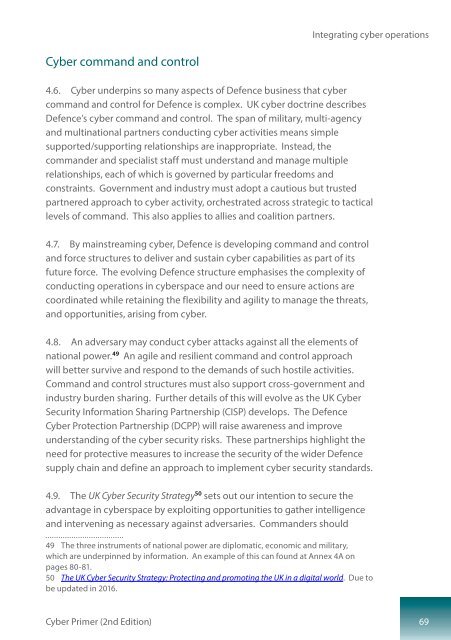Cyber Primer
AEWhbF
AEWhbF
You also want an ePaper? Increase the reach of your titles
YUMPU automatically turns print PDFs into web optimized ePapers that Google loves.
Integrating cyber operations<br />
<strong>Cyber</strong> command and control<br />
4.6. <strong>Cyber</strong> underpins so many aspects of Defence business that cyber<br />
command and control for Defence is complex. UK cyber doctrine describes<br />
Defence’s cyber command and control. The span of military, multi-agency<br />
and multinational partners conducting cyber activities means simple<br />
supported/supporting relationships are inappropriate. Instead, the<br />
commander and specialist staff must understand and manage multiple<br />
relationships, each of which is governed by particular freedoms and<br />
constraints. Government and industry must adopt a cautious but trusted<br />
partnered approach to cyber activity, orchestrated across strategic to tactical<br />
levels of command. This also applies to allies and coalition partners.<br />
4.7. By mainstreaming cyber, Defence is developing command and control<br />
and force structures to deliver and sustain cyber capabilities as part of its<br />
future force. The evolving Defence structure emphasises the complexity of<br />
conducting operations in cyberspace and our need to ensure actions are<br />
coordinated while retaining the flexibility and agility to manage the threats,<br />
and opportunities, arising from cyber.<br />
4.8. An adversary may conduct cyber attacks against all the elements of<br />
national power. 49 An agile and resilient command and control approach<br />
will better survive and respond to the demands of such hostile activities.<br />
Command and control structures must also support cross-government and<br />
industry burden sharing. Further details of this will evolve as the UK <strong>Cyber</strong><br />
Security Information Sharing Partnership (CISP) develops. The Defence<br />
<strong>Cyber</strong> Protection Partnership (DCPP) will raise awareness and improve<br />
understanding of the cyber security risks. These partnerships highlight the<br />
need for protective measures to increase the security of the wider Defence<br />
supply chain and define an approach to implement cyber security standards.<br />
4.9. The UK <strong>Cyber</strong> Security Strategy 50 sets out our intention to secure the<br />
advantage in cyberspace by exploiting opportunities to gather intelligence<br />
and intervening as necessary against adversaries. Commanders should<br />
49 The three instruments of national power are diplomatic, economic and military,<br />
which are underpinned by information. An example of this can found at Annex 4A on<br />
pages 80-81.<br />
50 The UK <strong>Cyber</strong> Security Strategy: Protecting and promoting the UK in a digital world. Due to<br />
be updated in 2016.<br />
<strong>Cyber</strong> <strong>Primer</strong> (2nd Edition) 69


